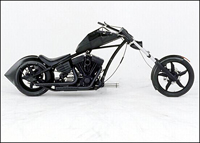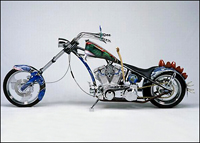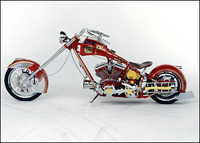Chop, chop, chop to create a minimalist machine
Just what is a chopper? Like the bobber, the chopper is created by removing or chopping off unnecessary components from a motorcycle. Who needs a windshield, front fenders, big headlights, crash bars, and big seats? Create a chopper. Chop off those components and make the motorcycle lighter. Bikers started raking the front end of their choppers so the angle of the fork to the ground began decreasing allowing for a greatly increased wheelbase for the chopper. The handlebars on the chopper were raised high and called ape hangers. The front tire was made small and the rear tire was made fat. Some bikers even removed the battery and used a magneto to reduce chopper weight. The gas tank on the chopper became small as was the headlight. Anything deemed unnecessary was removed. This made for a bike style that was unique and tailored to the rider. Each rider decided just what needed to be done to his motorcycle to create the chopper he desired.
Choppers have a long history. After soldiers returned home from World War II, they seemed dissatisfied with the motorcycles that were available to them from Harley-Davidson and Indian. They remembered the machines they had seen in Europe that were lighter in weight and seemed to have more excitement. The soldiers started to hang out with their motorcycle buddies to regain some of the camaraderie they had felt in the service. These groups of buddies soon decided that their motorcycles needed changes. Motorcycle choppers were born.
First, they either removed or shortened (bobbed) the fenders on their motorcycles. This reduced the weight and made the bikes look better in their eyes. These bikes began to be called bobbers. Changes kept occurring but it wasn't until the late '60s and early '70s that the bobbers gave way to the choppers. After release of the seminal movie Easy Rider in 1969, a whole new movement began. Riders wanted a motorcycle like the one ridden by Peter Fonda in the movie. They wanted a chopper.
As always occurs, this rise of the chopper created by individual backyard mechanics, soon was followed by talented designers whose choppers were sought after. An individual didn't need to actually do the work, just express what he wanted to a chopper designer. Arlen Ness was one of the first such designers.
Chopper creation slowed a little as many motorcyclists started customizing their bikes instead of chopping them. Then in the 1990s the chopper seemed to become more popular. Choppers are not just indigenous to Harley-Davidson. Numerous choppers have been built from British and Japanese bikes.
I took a few pictures of some choppers at a Polar Bear Grand Tour meeting at the Fort Dix Club in New Jersey. Check out the pictures at the top of this article. Note the similarities in the two bikes even though the red chopper is extremely low to the ground and the other chopper has ape hanger handlebars and is more of a rat bike.
To allow you to pursue the subject of choppers on this site and on the Web, a category, Choppers, has been added to the Motorcycles site. You'll find it under "Choppers Trikes Sportbikes" on the left side of every page of the site.
Also, we have a Chopper Gallery of chopper pictures submitted by About.com visitors. If you have a chopper, submit a picture and description to our Moto Fotos feature to be considered for inclusion in the Chopper Gallery.
Choppers started because riders were dissatisfied with what Harley-Davidson was producing. Rather than abandon the Motor Company, riders streamlined the Harley bikes by removing excess equipment and then modifying the engines, rake, and suspension. The result was a personalized chopper much like the bike in Easy Rider.
The steady evolution of the motorcycle continues. New bikes are more and more technically sophisticated with plenty of accessories, yet the chopper continues to survive as riders seek that minimalist simplicity that only the chopper can supply. Are choppers here to stay? Only you have the answer.
|


 |
|
